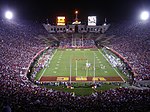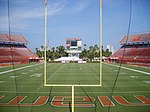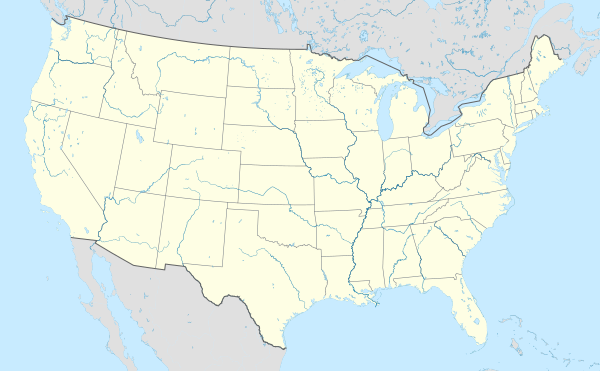
The 1991 CONCACAF Gold Cup was the first edition of the Gold Cup, the soccer championship of North America, Central America and the Caribbean (CONCACAF), and the eleventh overall CONCACAF tournament. The last time the CONCACAF Championship was held was 1971, from that point on the first-place finishers of World Cup qualifying were considered continental champions.

The 1993 CONCACAF Gold Cup was the 2nd edition of the CONCACAF Gold Cup, the biennial international men's football championship of the North, Central American and Caribbean region organized by CONCACAF. The tournament took place from 10 to 25 July 1993 and jointly hosted by 2 cities in two North American countries: Mexico, and the United States.
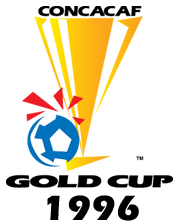
The 1996 CONCACAF Gold Cup was the third edition of the Gold Cup, the soccer championship of North America, Central America and the Caribbean (CONCACAF).
The 2000 CONCACAF Gold Cup was the fifth edition of the Gold Cup, the soccer championship of North America, Central America and the Caribbean (CONCACAF), and the 15th overall CONCACAF tournament. It was held in Los Angeles, Miami, and San Diego in the United States. The format of the tournament changed from 1998; it was expanded to twelve teams, split into four groups of three. The top two teams in each group would advance to the quarter-finals. Peru and Colombia were invited from CONMEBOL, and the Republic of Korea were invited from AFC.

The 2005 CONCACAF Gold Cup was the eighth edition of the Gold Cup, the soccer championship of North America, Central America and the Caribbean (CONCACAF). It was contested in the United States in July 2005. The United States emerged victorious in the final against an upstart Panama team led by tournament MVP Luis Tejada. After regulation and 30 minutes of extra time ended scoreless, the U.S. won 3–1 on penalties.
Listed below are the dates and results for the 1994 FIFA World Cup qualification rounds for the North, Central American and Caribbean zone (CONCACAF).
The 1998 FIFA World Cup qualification, CONCACAF zone ran from March 1996 to November 1997 in order to determine the three CONCACAF representatives at the 1998 FIFA World Cup. For an overview of the qualification rounds, see 1998 FIFA World Cup qualification.
The CONCACAF Semi-final Round of the CONCACAF zone of the 2002 FIFA World Cup qualification, was contested between the 12 remaining teams of the qualification process. The teams were divided into 3 groups of 4 teams each. They would play against each other on a home-and-away basis. The group winners and runners-up would advance to the Final Round.
The 1989 CONCACAF Championship was the tenth and final edition of the CONCACAF Championship held under the format of serving as qualification to the 1990 FIFA World Cup and having no host nation for the final round. The tournament would be succeeded by the CONCACAF Gold Cup in 1991.

The 2009 CONCACAF Gold Cup was the tenth edition of the CONCACAF Gold Cup competition, and the twentieth soccer championship of North America, Central America and the Caribbean (CONCACAF). It was played from July 3 to 26, 2009 in the United States. This competition was the fourth tournament without guests from other confederations. Mexico won their fifth Gold Cup, and eighth CONCACAF Championship overall, after beating the United States 5–0 in the final. It was the second consecutive Gold Cup final and fourth overall to feature Mexico and the United States and the third won by Mexico.
The 2009 CONCACAF Gold Cup group stage was played July 3–12, 2009.

The 1998 CONCACAF Gold Cup final was a soccer match to determine the winners of the 1998 CONCACAF Gold Cup. The match was held at the Los Angeles Memorial Coliseum in Los Angeles, United States, on February 15, 1998, and was contested by the winners of the semi-finals, the United States and Mexico. Mexico, who had won both 1993 CONCACAF Gold Cup and 1996 tournaments, successfully defended their title with a 1–0 win over North American rivals United States. A total of 91,255 fans, described as a "heavily pro-Mexico crowd", watched the match at the Los Angeles Memorial Coliseum.

The 1996 CONCACAF Gold Cup final was a soccer match to determine the winners of the 1996 CONCACAF Gold Cup. The match was held at the Los Angeles Memorial Coliseum in Los Angeles, United States, on January 21, 1996, and was contested by the winners of the semi-finals, Brazil and Mexico. Mexico, who had won 1993 CONCACAF Gold Cup, successfully defended their title with a 2–0 win over Brazil. As Gold Cup champions, Mexico earned a berth into the 1997 FIFA Confederations Cup in Saudi Arabia as the representative from CONCACAF.
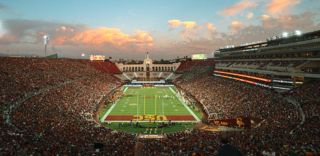
The 1991 CONCACAF Gold Cup final was a soccer match played on July 7, 1991, at the Memorial Coliseum in Los Angeles, to determine the winner of the 1991 CONCACAF Gold Cup. United States beat Honduras 4–3 on penalties after the game finished 0–0 after extra time. This was the United States' first major title. It was also the first ever Gold Cup Final and first to be decided by a penalty shoot-out. As Gold Cup champion, the United States represented CONCACAF at the 1992 King Fahd Cup in Saudi Arabia.

The fourth and final round of CONCACAF's process of 1998 FIFA World Cup qualification was played throughout 1997, from 2 March to 16 November. It was the first Hexagonal final round in CONCACAF's history.

The 2014 Copa Centroamericana was the 13th Copa Centroamericana, the regional championship for men's national association football teams in Central America. It was organized by the Unión Centroamericana de Fútbol or UNCAF, and took place in the United States.

The United States national team has participated in all seventeen editions of the CONCACAF Gold Cup since its foundation in 1991 to replace the CONCACAF Championship. The United States is also the second-most successful team in the tournament, having won seven titles since the beginning of the Gold Cup, behind Mexico by just two titles. Before the Gold Cup however, the United States only qualified for two of the previous ten CONCACAF Championships.
The CONCACAF Gold Cup is North America's major tournament in senior men's football and determines the continental champion. Until 1989, the tournament was known as CONCACAF Championship. It is currently held every two years. In earlier editions, the continental championship was held in different countries, but since the inception of the Gold Cup in 1991, the United States are constant hosts or co-hosts.
The CONCACAF Gold Cup is North America's major tournament in senior men's football and determines the continental champion. Until 1989, the tournament was known as CONCACAF Championship. It is currently held every two years. In earlier editions, the continental championship was held in different countries, but since the inception of the Gold Cup in 1991, the United States are constant hosts or co-hosts.
The knockout phase of 1991 CONCACAF Gold Cup began on July 5, 1991, with the quarter-finals and ended on July 7, 1991, with the final at the Los Angeles Memorial Coliseum in Los Angeles, United States.
